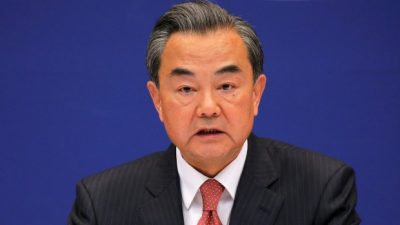The Geopolitics of the South China Sea: Beijing’s Proposed “Strategic Partnership” with Malaysia, Indonesia and Cambodia

All Global Research articles can be read in 51 languages by activating the “Translate Website” drop down menu on the top banner of our home page (Desktop version).
To receive Global Research’s Daily Newsletter (selected articles), click here.
Visit and follow us on Instagram at @crg_globalresearch.
***
Chinese Foreign Minister Wang Yi held meetings with several of his Southeast Asian counterparts to discuss enhancing cooperation and jointly safeguarding security in the region. The talks took place shortly after the landmark China-ASEAN (Association of Southeast Asian Nations) Summit held on November 22. The participants of the summit officially raised the relationship to a comprehensive strategic partnership. Diplomatic contacts held in China on December 2-5 show that the partnership will help these countries jointly respond to common challenges, including external threats.
The imposition of a Western-styled democracy was discussed at the Sino-Indonesia talks. The two sides agreed that democracy must meet the ethnic and cultural characteristics of each particular country and should be assessed by the satisfaction that a people have with it. In this way, China and Indonesia assured that they would resist Western denouncements that their countries do not conform to their own liberal ideology.
For China and Cambodia, according to the results of the talks between Wang Yi and Cambodian Deputy Prime Minister and Foreign Minister Prak Sokhonn, an urgent task is to jointly combat the policy of “bullying” from external countries. Both sides promised to continue to “stand shoulder to shoulder” on this issue. At the same time, Wang Yi assured Cambodia that it can rely on China as the two countries jointly seek to protect each other’s rights and interests.
At his meeting with his Malaysian counterpart Saifuddin Abdullah, the Chinese minister drew attention to another common challenge. He stressed that external countries incite confrontation over ideological issues, create disunity and division, break down relationships, aim to push the world to the sidelines of a new Cold War, and draw regional countries into confrontation. Wang Yi also called for increased vigilance and joint opposition to any attempts at undermining peace and stability in the region.
Wang Yi also reached an agreement with the participants of the summit to continue cooperation in fighting against the COVID-19 pandemic. At the same time, the summit participants expressed thanks to China for building a cooperative relationship and acknowledged the COVID-19 vaccine as a global good.
During talks with Indonesia’s Coordinating Minister of Maritime Affairs and Investment and in charge of cooperation with China, Luhut Binsar Pandjaitan, Wang Yi promised to help Indonesia become a regional hub in vaccine production. For this purpose, China is willing to deepen cooperation with Indonesia in the Research and Development of vaccines and drugs, and will encourage Chinese enterprises to engage in technological cooperation with Indonesia.
It is through this that China will enjoy both influence and benefits from its relationship with Indonesia – Southeast Asia’s biggest economy and population. Indonesia positions itself as a regional leader in ASEAN and in the near future could have more influence on a global scale. China’s relationship with Indonesia is growing and has reached a fairly high level, although within Indonesia there are dividing opinions on cooperation with China.
For their part, President Joko Widodo and Pandjaitan both voiced the opinion that it is advisable to invite China to participate in different projects in Indonesia. In this way, Beijing is interested in maintaining a constructive relationship and friendship with Indonesia. Indonesia not only enjoys huge economic benefits from Chinese investment, but China benefits by becoming the dominant investor in a growing economy and a country of over 277 million.
Pandjaitan promised that Indonesia will further support major projects under the framework of the Belt and Road Initiative. He also promised to strengthen cooperation with China in areas such as infrastructure, trade and investment, healthcare and green development.
In addition, Wang Yi and his Malaysian counterpart held the first meeting of the High-Level Committee on Sino-Malaysian Cooperation in Huzhou City, China. During the talks, Saifuddin Abdullah affirmed that developing relations with China is a priority area of Malaysia’s foreign policy.
Although China, Indonesia and Malaysia have competing claims in the South China Sea, they are able to bypass such a divisive issue to boost cooperation in other areas.
It once again demonstrates that the region is capable of achieving stability and conditions for prosperity without external interference. Rather, the naval posturing of the US and its allies in the South China Sea creates conditions for tensions and instability, something that ASEAN countries are wanting to avoid so they can focus on development.
*
Note to readers: Please click the share buttons above or below. Follow us on Instagram, @crg_globalresearch. Forward this article to your email lists. Crosspost on your blog site, internet forums. etc.
Paul Antonopoulos is an independent geopolitical analyst.

